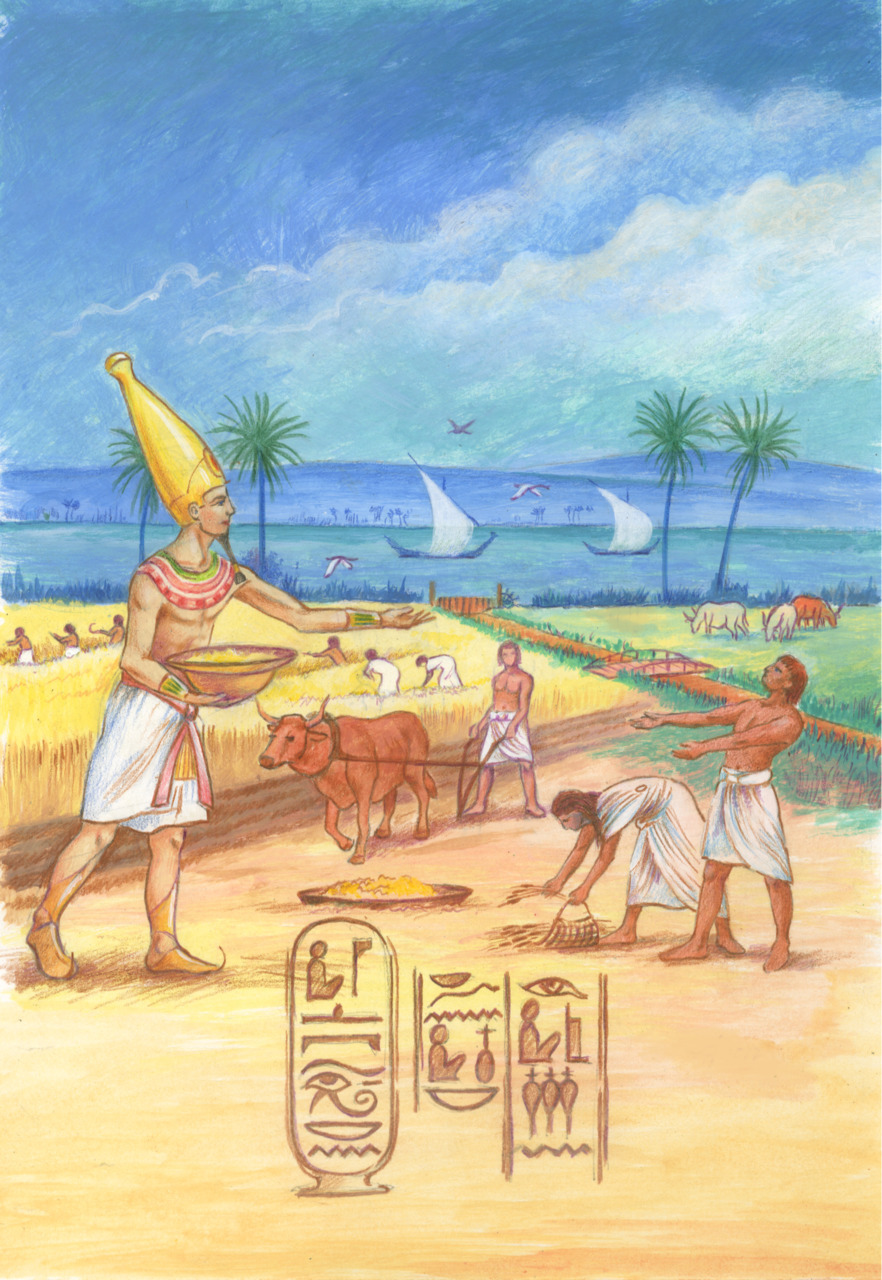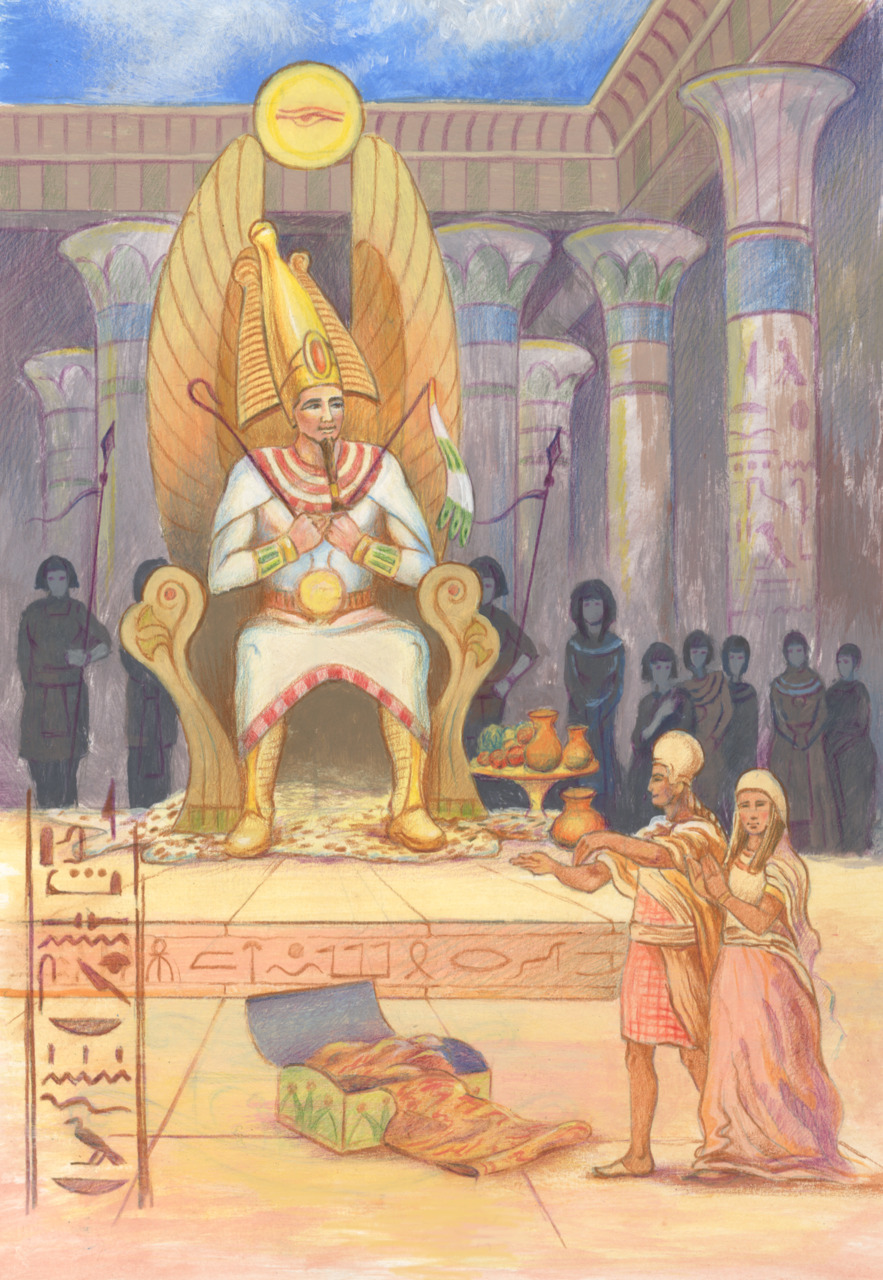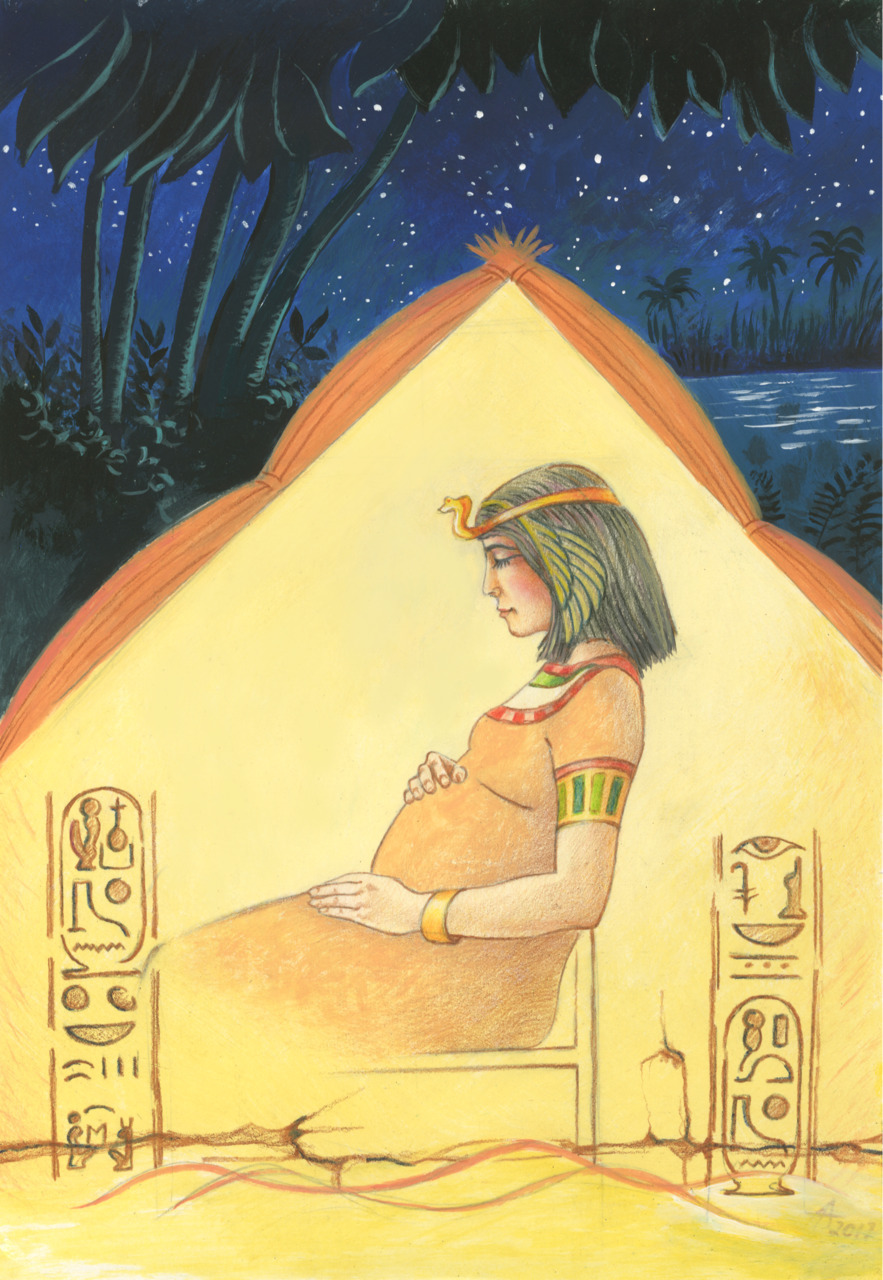
Бесплатный фрагмент - Horus and Seth: Two Ancient Egyptian Gods
Horus and Seth: Two Ancient Egyptian Gods
Chapter One
Long ago, when people believed that the world was flat and that the universe had sprung from a cosmic egg, ancient Egypt was ruled by Osiris and his beautiful wife, Isis, who were descendants of the gods. According to the priests, the pharaoh was the eldest son of Geb, god of the earth, and Nut, goddess of the sky. That was why he had the honor of succeeding his father and becoming the fifth ruler of Egypt.
The gods could be distinguished from the people by their height and physical strength, as well as their knowledge of science, astrology, and the supernatural. Over the ages these children of the gods reverently preserved the established order. Osiris ruled these lands for several centuries and had succeeded in winning the respect of the Egyptians.
Unlike other rulers, the pharaoh did not burden his people with high taxes but rather taught them agriculture, horticulture, construction, and other sciences. To ensure that the Egyptian people did not want, he saw to it that every farmer had water and seed so that they may cultivate the land and live in plenty. The ruler also felt it his mission to eradicate ignorance, so everyone who wanted to learn was taught reading, writing, mathematics, astrology, and the art of serving the gods.

Those difficulties that did occur during his reign did not harden Osiris’s heart. Even when he handed down judgments on his citizens, the pharaoh was so magnanimous that those accused of petty crimes were always absolved, for he believed that everyone deserved a second chance. Human life was valued highly. Those accused of serious crimes were never executed but sent to cultivate the arid plots and oases of Upper Egypt. This was needed so that travelers lost in the desert could quench their thirst and find a place to stay for the night. In these parts, such a punishment was seen to be worse than death because the criminals has lost their right to tend their own plots and live in a just society.
Even though some of his generals and aides lamented their lord’s excessive kindness, Osiris was resolute. The pharaoh and his high priests believed that each person contains a spark of the divine that helps men know their mistakes and return to the path of truth. The people valued the wisdom and magnanimity of their ruler, who strongly believed that it was only by mercy that one could change into a better person.
During the many years of his reign, the sovereign’s dream of a just society did not fade for a moment. He considered his greatest achievement to be that he improved the lives of ordinary people. Now every Egyptian had his own plot of land and a roof over his head, and the children went to school for free. For a long time Osiris and Isis had no children of their own. They did not despair of this, and they knew that they would someday have an heir to whom they could leave their kingdom.
Despite his peaceful nature, the pharaoh did occasionally have to fight enemies who had encroached on his lands. The kings of neighboring powers dreamed of controlling Egypt’s riches, and they never stopped trying to subjugate its people. This meant that Osiris, who loved peace, was forced to continually defend his lands from foreigners.
He was served by his trusted general, Anubis, who accompanied his lord on every campaign. Osiris was a master strategist, and under his leadership the army never knew defeat. Violence brought woe to the pharaoh’s heart, but the prosperity and unity of Egypt came before all else. After securing his latest victory and returning home to Egypt, Osiris called for a feast to mark the occasion.

***
With the date set, Osiris declared a holiday and made arrangements for the festivities. Everyone rejoiced at the pharaoh’s return. In temples throughout Egypt, they held services that broke out into magnificent celebrations.
For Osiris and his beautiful wife, Isis, this holiday was joyful for another reason: Isis had recently discovered that she was with child, the future heir to the throne. The pair kept this good news a secret for a while until they were sure.
After morning prayers, the townspeople, including tradesmen and the elite, began to gather at the palace. Their sovereign, dressed in white, sat solemnly on the high throne in full regalia. Osiris joyfully received his guests, who bore with them to the pedestal gifts of bread, fruits of the earth, clothing, and other gifts of the Nile. Throughout the land people celebrated the return of their ruler alive and unharmed.
That evening, after the daytime festivities, Osiris and his honored guests — members of the aristocracy and the rulers of neighboring lands — attended a banquet at the palace.
***
It was a festive occasion. Many guests came to honor the return of the Egyptian ruler, including his younger brother, Seth. Seth had distinguished himself at a young age, and Osiris named him the leader of Upper Egypt. Osiris gave him near-complete authority in the region as a mark of respect. But despite the breadth of his power, Seth nonetheless had to submit to the pharaoh. The desolate lands of Upper Egypt were far smaller than the those of the river delta, which Osiris ruled. Seth, a skilled warrior, was in many respects superior to his brother. In the depths of his heart, he was dissatisfied with the way things were. He was a harsh ruler in his lands, and this provoked continual unrest among his subjects.
Even as children, the differences in their personalities were obvious. The older one was gentle, and the younger one was severe. Their parents encouraged the boys to be friends, for they knew that a rivalry would bring nothing but misfortune to the Egyptian people and destroy the kingdom. To prevent the excesses of unchecked power, from long ago the Egyptian supreme ruler was joined by yet another mysterious authority whose remit was to care for the world and promote balance, well-being, and prosperity. This was the Council of Nine. Its main goal was to ensure the balance of power in Egypt, to oppose injustice, and to prevent war. The identities of its members were subject to much conjecture. Because no one knew the names of these nine sages, whose decisions formed the basis of the pharaoh’s every decree, the people called them the Nine Unknown, or simply the Nine. Some said that they represented the major regions of Egypt, while others supposed that the Council was made up of high priests who held enormous influence in the kingdom.
Decisions of the Council were made by majority vote, and everyone, including the supreme ruler, had to abide by them. Osiris and Seth, along with other divine members of their family, were part of the Council, though this was not known for certain by the people. But despite being part of the secret society, the brothers were still required to follow its decisions and agree to all of its resolutions.
Seth was not naturally inclined to listen to other people’s opinions, but there was nothing else to be done. He followed the Council’s orders, even when, as a young man, he had to help his older brother, now the pharaoh, and accompany him on various journeys.
One dark night they were traveling down the Nile when they passed a cave that was guarded by a giant sea serpent named Apep. Every night Apep would try to swallow the sun god Ra as he traveled on the Sun Boat, and it was only by Osiris’s protection that Egypt was kept out of eternal darkness. Osiris could usually fend off the sun-swallowing monster by himself. On every encounter the serpent broke off its pursuit, but one day Osiris stumbled and fell as they fought. Apep had planned on attacking Osiris first before moving on to Ra, who observed the fight indifferently. After dropping his spear, Osiris lay prostrate in the bottom of the boat, awaiting his fate. He watched the frightening head of the serpent approach, but then, just in time, Seth came to his aid. His younger brother fought the serpent and forced it to retreat. Osiris was grateful, and he often recounted Seth’s deed in private and during great feasts, telling everyone of the time his life hung by a thread and how Seth came to save him before it was too late.

On one such occasion, Osiris was again telling the story of that night to his honored guests. He told them that he remained indebted to his brother, who had no fear of the serpent and saved his life. Because of this gallant feat, Osiris could now stand before these important guests, and for this reason, he said, the hero of the day was not the pharaoh but his protector, Seth. To honor his safe return, the ruler asked Seth to accompany Ra on the river that night. Seth agreed, and Osiris told Ra the news.
Seth was jealous of Osiris’s wealth and power, which he had inherited by being the eldest son. Unlike his noble ruler, Seth was calculating, proud, and cruel. The distance between the two had only grown over the years, so it was with mixed feelings that Seth accepted Osiris’s gratitude. When they spoke, Seth often criticized Osiris’s methods. He asked him to raise taxes to equip a powerful army that could conquer neighboring territories. His dream was one of world domination, but he was never able to convince the pharaoh, no matter how heated their arguments became.
With increasing urgency he tried to convince Osiris to take his side and put their nation on a path to war. In this event, he was prepared to lead the army himself while Osiris remained to rule in Egypt. Facing constant refusal, Seth would bring his proposals before the Council. But to his dismay, the majority sided with Osiris, and Seth was left with no option but to make his peace with it. Being prideful, he refused to abandon his schemes. He continued making plans to take over the world, for which he would stop at nothing.
Seth knew that the Council would always side with Osiris because he was the ruler of Egypt. In his heart of hearts, Seth often regretted saving his brother from Apep. If he had just left the serpent to kill Osiris, then Seth would be pharaoh. Then he could easily convince the Council to launch an invasion of the neighboring kingdoms. It was for this reason that Seth’s heart became overwhelmed with evil sentiments. He felt the pang of injustice at having to remain in the shadow of this ruler, whom these people and distinguished guests honored as a great sovereign.
Holding back his rage, Seth got up from his chair and delivered a speech in which he thanked Osiris for his kind words and agreed to accompany Ra on his nighttime journey across the Nile. He drank heavily, the better to have a decisive conversation about the future of Egypt.
Late that night, at the appointed time, Osiris and Seth went to the river. They boarded the Sun Boat to accompany Ra across the Nile. After a day of festivities and a long evening of banqueting, Osiris was exhausted, and he was not in the mood to discuss serious matters. Osiris again defeated the serpent and delivered Ra safely to the usual location. On the way back, Seth’s drunken arguments became increasingly aggressive. Because of their disagreement about the future of the kingdom, he challenged his brother to a duel. Seth killed Osiris, cut his body into pieces, and threw them into the river. Fearful of the wrath of Isis and the Council, upon his return Seth told them that Osiris had fallen in battle with the serpent, having been tired and unable to cope with the strong current. Now his body lay at the bottom of the Nile.
Isis could not believe that her husband had died fighting the serpent. When she searched the bottom of the river and found the severed pieces of his corpse, the queen knew that this was Seth’s doing.
Chapter Two
Isis and her sister, Nebet-het, mourned the death of Osiris. The general Anubis gathered the pharaoh’s remains, embalmed them, and hid them in a cave. Isis promised that she would return for her murdered husband and that his embalmed corpse would repose in a purpose-built temple as befitted a supreme ruler of Egypt.
The queen knew that Seth would stop at nothing, killing anyone who stood between him and the throne. To protect her unborn child, the rightful heir to the throne, she immediately sought refuge in the marshy delta of the Nile. There she built a small house among thickets of papyrus, far from any people, and she anxiously awaited the birth of the future king.

Isis, who had a deep knowledge of astrology, kept track of the movements of the heavenly bodies. The birth of a god was meant to be marked by a special sign. The winter sky was alight with a multitude of stars, but Isis waited for the appearance of a new, exceptionally bright star that would herald the coming of a savior, a son of the gods. At the end of the first month of winter, the day the infant Horus was born, a new star shone brightly in the night sky. The significance of this was noted not only by Isis but also by the sages who studied heavenly objects from all over the world. When they saw the star, they knew that a child, the descendant of the gods whom they had been expecting, had been born. To pay their respects to the infant and his mother, three wise men followed this bright star to the Nile delta bearing gifts. They found Isis’s refuge, and next to her in a reed basket was the newborn Horus, to whom they presented their gifts. These wise men told the queen that they had made the journey so that they could bow before the future ruler of Egypt. Isis was pleased by the omen and the arrival of the travelers. She knew that her son was destined for great fortune and that his name would be remembered until the end of time. Fearing that a vengeful Seth would find out about the birth, Isis followed Anubis’s advice and decided to remain in hiding until Horus was grown.
***
But what Isis and her general feared did not come to pass. When Seth’s court astrologers informed him of the new star, he sent soldiers all over the kingdom to kill the infant. But they never found the location of the rightful heir. This was unfortunate for Seth, who in the meantime was unable to assume the throne during the nine months since Osiris’s death. He told the Council that Apep was the one who had killed Osiris, but they would not be convinced until they saw the body. As his patience waned, Seth became more and more insistent that they recognize the death of the pharaoh and name him the rightful heir. He went as far as to threaten them, saying that unless the Council soon made him the supreme ruler, he would return to the desert regions of Upper Egypt, leaving Ra without an escort on the Sun Boat. Apep would be free to swallow the sun, Egypt would be enveloped by a never-ending darkness, and stars would shine no more.
Бесплатный фрагмент закончился.
Купите книгу, чтобы продолжить чтение.